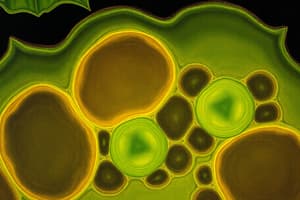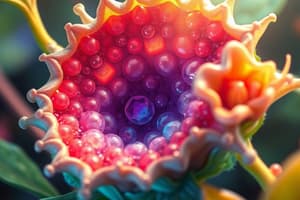Podcast
Questions and Answers
কোষ প্রাচীরের কাঠামোর মূল উপাদান কী? এর ফাংশন কী?
কোষ প্রাচীরের কাঠামোর মূল উপাদান কী? এর ফাংশন কী?
কোষ প্রাচীরের মূল উপাদান হল সেলুলোজ, যা কোষের শক্তি ও কাঠামো প্রদান করে। এর ফাংশন হল কোষকে সমর্থন ও সুরক্ষা প্রদান করা, কোষের আকার বজায় রাখা এবং কোষে পদার্থ আনা-নেওয়া নিয়ন্ত্রণ করা।
ক্লোরোপ্লাস্ট কী এবং এর ফাংশন কী?
ক্লোরোপ্লাস্ট কী এবং এর ফাংশন কী?
ক্লোরোপ্লাস্ট হল এক ধরনের প্লাস্টিড যা প্রকাশসংশ্লেষণ করে। এর ফাংশন হল আলো-নির্ভর বিক্রিয়া ও আলো-স্বাধীন বিক্রিয়া সম্পন্ন করা, যা কার্বন ডাই অক্সাইডকে গ্লুকোজে রূপান্তর করতে সাহায্য করে।
ভ্যাকুওল কী এবং এর ফাংশন কী?
ভ্যাকুওল কী এবং এর ফাংশন কী?
ভ্যাকুওল হল কোষের একটি অংশ যা জল, লবণ ও পুষ্টি সংরক্ষণ করে। এর ফাংশন হল কোষের চাপ বজায় রাখা, কোষীয় অবশিষ্ট পদার্থ ভেঙ্গে ফেলা ও কোষীয় ক্রিয়াকলাপ নিয়ন্ত্রণ করা।
এপিডার্মাল টিস্যু কী এবং এর ফাংশন কী?
এপিডার্মাল টিস্যু কী এবং এর ফাংশন কী?
ক্যাক্টি কী এবং এর কী ফাংশন?
ক্যাক্টি কী এবং এর কী ফাংশন?
আকাশচারী উদ্ভিদ কী এবং এর ফাংশন কী?
আকাশচারী উদ্ভিদ কী এবং এর ফাংশন কী?
Flashcards are hidden until you start studying
Study Notes
Cell Wall Structure
- Made up of:
- Cellulose (main component): a polysaccharide that provides strength and structure
- Hemicellulose: a complex carbohydrate that binds cellulose fibers together
- Pectin: a gel-like substance that fills the spaces between cellulose fibers
- Lignin: a rigid polymer that adds strength and hardness to the cell wall
- Functions:
- Provides support and protection to the cell
- Maintains cell shape
- Regulates the flow of materials in and out of the cell
Plastids and Photosynthesis
- Types of plastids:
- Chloroplasts: responsible for photosynthesis, contain the pigment chlorophyll
- Chromoplasts: contain pigments that give plants their color
- Amyloplasts: store starch
- Photosynthesis:
- Light-dependent reactions: occur in the thylakoid membranes, produce ATP and NADPH
- Light-independent reactions (Calvin cycle): use ATP and NADPH to convert CO2 into glucose
- Equation: 6 CO2 + 6 H2O + light energy → C6H12O6 (glucose) + 6 O2
Vacuoles and Storage
- Functions:
- Store water, salts, and nutrients
- Maintain cell turgor pressure
- Break down and recycle cellular waste and debris
- Types of vacuoles:
- Central vacuole: large, membrane-bound compartment that stores water and salts
- Lysosomes: contain digestive enzymes that break down cellular waste
Tissue Types and Functions
- Meristematic tissue:
- Found in growing tips of stems and roots
- Cells are undifferentiated and can differentiate into various cell types
- Epidermal tissue:
- Covers the surface of the plant
- Functions: protects the plant, regulates water loss, and senses the environment
- Ground tissue:
- Makes up the majority of the plant's body
- Functions: supports the plant, stores nutrients, and provides structural support
- Vascular tissue:
- Consists of xylem and phloem
- Functions: transports water, minerals, and organic compounds throughout the plant
Cellular Adaptations
- Specialized structures that allow plants to thrive in different environments:
- Cacti: thick cuticles and CAM photosynthesis to conserve water
- Desert plants: deep roots to access water and small leaves to reduce water loss
- Aquatic plants: adapted roots for underwater growth and aerenchyma to facilitate gas exchange
- Epiphytes: aerial roots to absorb moisture and nutrients from the air
Studying That Suits You
Use AI to generate personalized quizzes and flashcards to suit your learning preferences.




